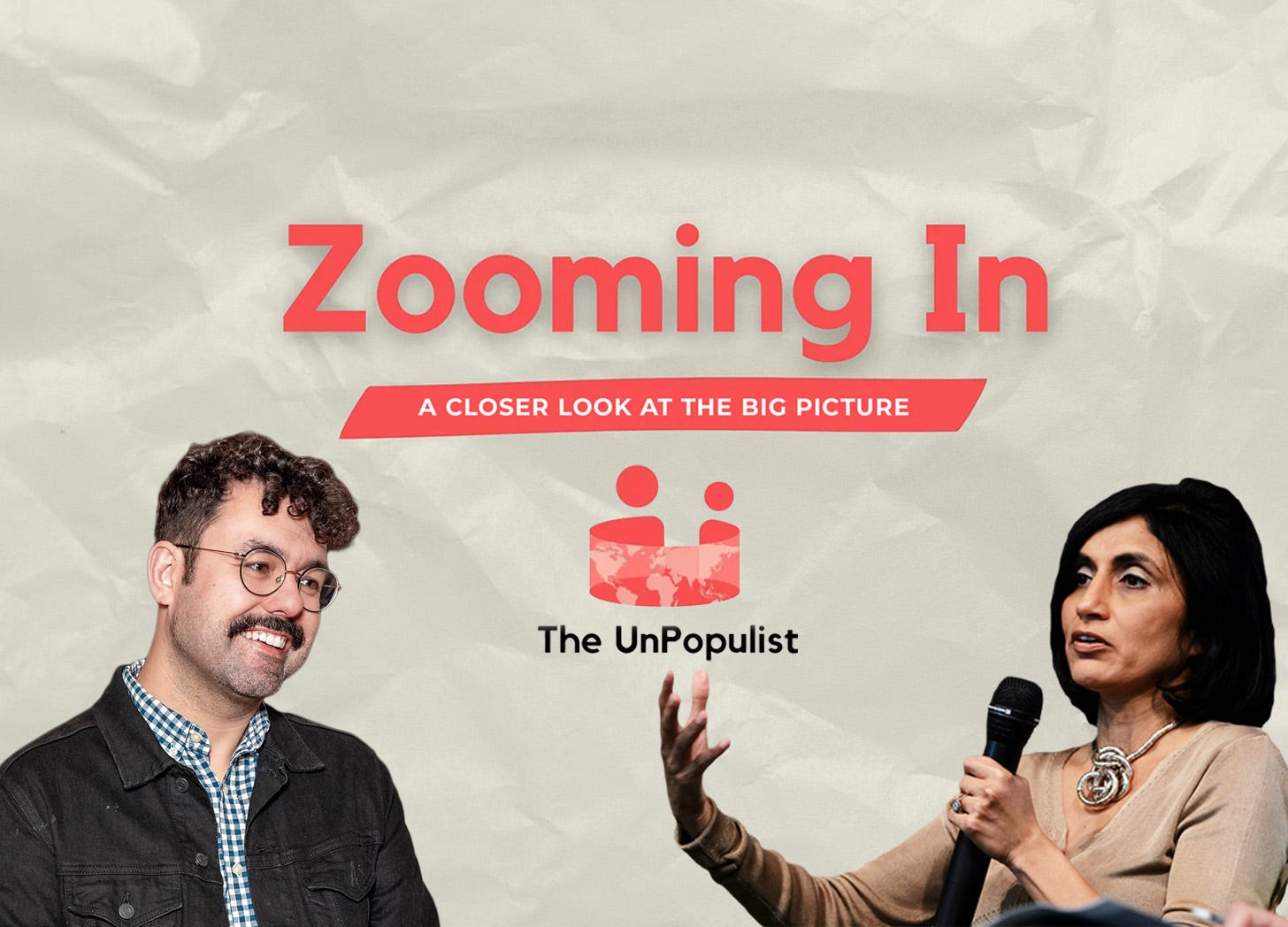Listen to Zooming In at The UnPopulist in your favorite podcast app: Apple Podcasts | Spotify | Google Podcasts | RSS | YouTube
Landry Ayres: Welcome back to Zooming In at The UnPopulist. I’m Landry Ayres.
What happens when the ideals of democracy are used to justify its own erosion? Can liberal democracy endure in an era where its strongest proponents appear to embrace the very authoritarianism they once opposed?
In this episode, The UnPopulist’s editor-in-chief Shikha Dalmia is joined by Zack Beauchamp, senior writer at Vox.
They discuss why authoritarian leaders often present themselves as champions of democracy and how they use democratic language to consolidate power, and delve into topics such as the resilience of liberal democracy in the face of these challenges. What causes democratic societies to turn against their own principles? How do cultural and economic anxieties fuel the reactionary movements seen around the world? And is it still possible to reverse this trend in countries where authoritarian practices have taken root?
We hope you enjoy.
A transcript of today’s podcast appears below. It has been edited for flow and clarity.
Shikha Dalmia: The UnPopulist is devoted to defending liberal democracy from the rising forces of modern authoritarianism around the world. After defeating fascism on the battlefield in World War II and communism after the Cold War, over the last 15 years, liberal democracies are finding themselves on the defensive as illiberal leaders, mostly but not exclusively from the right, are dutifully getting elected, not just in nascent, unestablished democracies, but also mature, established ones like the United States and India. Zack has written an engaging, fascinating, and deeply erudite book to explain this pandemic of authoritarianism. It is titled, The Reactionary Spirit: How America’s Most Insidious Traditions Swept the World.
Instead of beginning by tackling the title of your book, let me start with the subtitle: How America’s Most Insidious Traditions Swept the World.
America’s great contribution to the world is liberal democracy, a system where people elect their government and the government is required to protect a whole slew of liberal rights which are inalienable and universal. They come prior to the state and the state’s job is to simply protect those rights. There are all kinds of constraints imposed on the state before it can take away those rights. I mean, it has to show cause, it has to argue in a court of law, it has to justify itself, all of which is anti-authoritarian. And the system of this liberal democracy that the United States has invented is this idea of American exceptionalism, and it has—in the conventional understanding of things—swept the world because it’s delivered this untold peace, prosperity, at the same time as protecting rights and freedoms of individuals.
But you are saying there are some other, more insidious traditions that the world is now encountering [that originated in this country], and they are to some extent showing up in other countries. What are you talking about?
Zack Beauchamp: The way that I think about it is that the United States is not a country of one political tradition when it comes to democracy, but two. So, while the country was founded on all these lofty ideals and principles of constitutional design that you point out, other features of authoritarian political systems crept in at the beginning.
Slavery, I argue in the book, is an essentially authoritarian institution, and many elements of the American political system were designed with slave states in mind, often in fashions designed to distort the democratic facets of those institutions. So, for example, the three-fifths compromise, not operative today, but emblematic of a political strain that basically gave some people other people’s votes while counting them as not fully human—really a remarkable authoritarian formulation. Those facets of the Constitution are not aberrations on a fundamentally liberal tradition, nor the truer face of the United States when compared to the liberal-democratic components of America. It is a distinct, equally American tradition that I argue stems most fundamentally from slavery, and from the ideological context in which chattel slavery justified itself.
In the book I trace this back to ideas promulgated by the Stuart monarchy to legitimize not only their own rule but to link the holding of African slaves to divine right notions, to notions of a natural human hierarchy. Those ended up structuring not just the way that the Crown thought about it, but how American society in the South came to grow and the ideas that it grew around and what slave owners meant when they talked about slavery as our peculiar institution. That is all particularly American.
But how is the rest of the world experiencing this? I argue that those constraints created a very early version of what’s now a common authoritarian maneuver: which is that while the United States was formally dedicated to liberal-democratic principles, this authoritarian strain of its politics had to justify itself somehow, had to present itself as fitting with the way American citizens understood their political project. So what they did was develop a way of talking about authoritarian politics that sounds democratic and justifies itself in democratic terms.
That was novel at the time—in early 19th-century world politics. The authoritarians said, “This democracy thing is bad news.” They didn’t pretend to like democratic principles and then try to work around that—they made a frontal argument the old order was better and we needed to pursue it and that’s historically a much more common way of doing authoritarian politics. But I argue that the unique constraints surrounding the United States at its founding, and the clash of these dual traditions, produced a kind of mass authoritarianism that was especially appropriate for 21st-century politics because, contrary to some who say otherwise, we’re still in the end of history moment. There isn’t a strong ideological competitor to democracy on the global scene. So, what you end up getting is a world in which everybody starts to act like American authoritarians have always acted. Inside a democracy, someone like a Narendra Modi or a Viktor Orbán or a Benjamin Netanyahu, all of them have attacked democracy in their own way inside their countries under very different political circumstances and for very different reasons, and all of them have pretended to be democracy’s best friends while they’ve been doing it.
Dalmia: What’s interesting in what you are saying is: there’s not one political tradition in the United States, there’s been two. And they have been parallel to each other. It’s not like one ended and the other started—they were concurrent. The authoritarian tradition, which largely was applied to African-American slaves, had to justify itself in democratic terms. Democracy established the moral legitimacy and the moral high ground, so you had to use a vocabulary of democracy and even freedom to justify this tradition. It is interesting that the U.S., a country founded on the notion of freedom, was engaging in fairly authoritarian practices that would continue to grow after the revolution. Slavery became more brutal and worse after the revolution, not better. The revolution didn’t really put it on the path to extinction as a lot of people had hoped—a civil war was needed to do that.
Still, there’s still something counterintuitive about your story. Once America cleaned up its act and defeated communism and fully developed its liberal-democratic model, it was emulated by other states. There were demonstration effects to it: Other states looked at the success of the United States and started embracing it. That’s not exactly how I would think that the second model of competitive authoritarianism has spread. It’s not like Narendra Modi or Viktor Orbán are studying the practices of American slave owners in the antebellum South and saying, “Yes, I’m going to do that.” So, how is this developing? How is this American model being discovered and embraced in other parts of the world?
Beauchamp: The way that I think about it is a little like the way that a biologist might talk about convergent evolution, which if you’re not familiar with it, it’s this idea that entirely different species, no relationship, will develop the same features under evolutionarily similar circumstances and pressures. So, for example, in North America we have hedgehogs—spiny little things. In Australia, they’ve got echidnas, also spiny little things—But the echidnas are marsupials, no relationship to the mammals in North America, none at all, other than the spines. They both got them because they’re an efficient way to ward off predators. So under those circumstances, that kind of animal will develop spines as a defense, at least some of the time. That’s how I think about the kind of diffusion of this American model. It’s that the United States paved the way for a certain kind of authoritarianism. We blazed the trail. It’s not that others are walking down it so much as realizing for their own reasons that they could blaze a similar trail.
Now, sometimes that’s not true; sometimes the link is more direct. A lot of Nazi race legislation in the early years was based on Jim Crow. The darker elements of the American polity, its authoritarian systems, have been direct inspirations for people in other countries. During the Cold War, you had a sort of reverse version of that, where the existence of Jim Crow was a huge problem for the U.S. strategically in its competition with the Soviet Union, because they could always basically do an updated version of that Taylor line and say, “You guys talk this good game about liberty and democracy, but what’s happening with black people back at home?” That, actually, was a significant point of pressure and leverage for the Civil Rights Movement at the time. It’s not that these escape global notice, but it’s also not that, you know, Orbán has a copy of Rob Mickey’s book on Southern authoritarianism and is like, “Yes, yes, yes,” and is taking notes. It’s a more subtle process than that, right?
What the United States did is less like packaging something up and exporting it so much as showing that something could be done and showing the circumstances under which it would arise, most likely. And that’s what we’re seeing in the rest of the world today as the world becomes more ideologically American.
Dalmia: It’s kind of weird that this authoritarian model, which has been on the wane in the United States as liberal democracy has risen and become more entrenched, is at the same time being revived in some way. And not only is it being revived in the rest of the world, but it’s getting exported back to the United States. We are seeing the rise of a certain kind of authoritarianism, populist authoritarianism, right now—and some of its inspiration is coming from abroad. You talk about it in your book: one of the heroes of the MAGA movement and at CPAC, Viktor Orbán, whose techniques that you describe as competitive authoritarianism are now being applied very self-consciously by the MAGA movement. How is that playing out? How is this feedback loop working? And why is it gaining currency in the United States itself, which has been such a huge beneficiary of liberal democracy?
Beauchamp: To answer that question, I need to refer to the title: The Reactionary Spirit. That, I argue, is an outgrowth of a fundamental contradiction of any democracy—which is that democracies, by virtue of what they are ideologically, promise a certain level of equality. They’re premised on the idea that no one person has a right to rule anybody else at a foundational level, because at least in the sort of political moral sense, we’re all equals. But every society that becomes a democracy, or even is a democracy, is still defined by social stratification and hierarchy. So the reality of the social structure is in conflict with what the political system claims to stand for. What this does is create a conflict. It encourages people from the lower strata to say, “I would like things to change. I would like to use the democratic process to make things more equal.” And it gives them concrete and specific avenues for doing that.
So, what happens when the people who like the way that things are are confronted with these egalitarian movements? Well, they’ve got two choices. One of those choices, and I think mainstream conservative parties in lot of democracies do this, is just to say, “Look, we’ll fight those changes that we think are misguided, but ultimately, there’s not so much that we can do to win every fight, win every battle, and so when we lose, we’ll have to adjust to it. That’s just how democracy goes.” And ... another option is to say, “Okay, we care so much about preserving the existing social structure, about making things stay the way that they are, that if democracy starts to push our society in the other direction, well, we’re gonna fight, we’re gonna go outside of democracy. We’re going to attack democracy itself in order to prevent social change.”
The reason I launched into that to answer your question is that it’s at the core of what’s happening right now. The United States is undergoing another one of these conflicts where a faction, the faction led by Donald Trump, has chosen to embrace the reactionary spirit. They’ve taken that second pathway. And in doing so, the American authoritarian tradition is actively searching for other reactionary movements abroad to align with. This is a common tendency of all different political factions. And often to find inspiration in some of the more authoritarian versions of their ideas abroad. But what’s happening is that reactionary movements are recognizing that they share certain core political elements in common, which is how you make sense of this idea of a nationalist international. It like makes no sense to have American and German and Hungarian nationalists all in the same room together and liking each other, enjoying each other’s work, right? There’s a fundamental tension there. Understand that their nationalism is really about preserving domestic hierarchy and preserving existing elements of the domestic social order—they share a lot in common and they have a lot of enemies in common. So, despite the obvious differences in national stories, and especially the stories they tell themselves about history, they can find common cause.
Dalmia: There’s lot to unpack there. Sticking with the title of your book, The Reactionary Spirit ... from what you just said, and this is the thesis of your book too, none of these movements are actually attacking democracy. Trump is, for all his flaws, saying he’s the true democrat—because he represents the true will of the people. And that’s what Modi says, that’s what Orbán says, that’s what the far right in France say, that “It is the will of the people that we are representing.” And in a peak populist moment like ours, it is not so much that democracy is the enemy of autocrats—rather it is, I would say, liberalism that is the enemy of autocrats. Which brings me to this subtle tension between the way you approach this and the way I approach this.
For a while, we had this wonderful podcast by Aaron Ross Powell, Reactionary Minds, and we had a working definition of what “reactionary” was. The way we framed it was opposition to the forces of liberalism—whether economic or political liberalism or any kind of liberalism, because liberalism is a fundamental sensibility that’s open to change, and change is disruptive. It disrupts existing social orders, it disrupts existing hierarchies, brings in technological innovations, external influences, all of which anybody who’s benefiting from the current social order is going to resist in some way, shape, or form.
“[W]hat’s happening is that reactionary movements are recognizing that they share certain core political elements in common, which is how you make sense of this idea of a nationalist international. … There’s a fundamental tension there. Understand that their nationalism is really about preserving domestic hierarchy and preserving existing elements of the domestic social order—they share a lot in common and they have a lot of enemies in common.” — Zack Beauchamp
On the other hand, pure democracy is not the enemy of change. If you can get in a pure democracy a majority to put limits on how many immigrants are going to come into this country, what kind of trade this country can do with other places, who deserves citizenship and who doesn’t, the majority can decide that. The Founders of this country were extremely worried about the tyranny of the majority, which is why they put constitutional limits on what the government can do. The government can’t come in and strip away the rights of individuals. It has to respect those rights. Those are all a form of liberalism.
So, should we be more worried about defending liberalism or should we be more worried about protecting democracy?
Beauchamp: I think I want to answer that question by sharpening a little bit the distinction between liberalism and democracy—sharpening, but also complicating. Because there is a real tension at times between the two ideas that I don’t want to just gloss over.
Democracy, as you suggested, is majority rule, and majority rule can sometimes violate minority rights or rights that liberalism believes are properly owed to the people. That seems to be very much in tension with certain ideas of the Founders. But there’s a difference between this kind of situation, which I think is quite thorny philosophically, versus cases where the kinds of rights that are being violated are so constitutive of democracy, so necessary for democracy’s good functioning, that even a democratic majority can’t be seen as acting democratically when it takes them away because what they’re doing is revoking the ability of the people to replace them. They’re putting guardrails in place to prevent them from losing power—and that, to me, is obviously undemocratic. It’s not just illiberal, though it also is that; it is clearly a use of democracy against itself.
When I think about how this works, or at least how this has operated in modern anti-democratic politics, I think of Carl Schmitt, a German legal theorist in the interwar period. He briefly became a Nazi before the Nazis turned him down for being a fake anti-Semite, which by the way was not true. He was a very real anti-Semite. But Schmitt was, in addition to being quite a bad person, an extraordinarily brilliant lawyer and political theorist. One of his most searching arguments is that democracy and liberalism are beset by a fundamental paradox, which you referenced about the limits of belonging. It’s that liberalism has an aspiration towards universality—that’s the whole idea: universal human rights, universal protections, all people deserve certain levels of treatment by the state. But democracy has its own set of rules about who gets to participate. That line has to be drawn somewhere, and it always is drawn somewhere. Democracies have always preserved the power to say, “You’re in and you’re out of the voting population.” So his argument is that democracy isn’t liberal. It can’t be liberal. In fact, liberalism is opposed to true democracy because democracy is about being able to essentially choose a homogenous group, pick some characteristic of the group that defines what a citizen is, and make those the people who can choose, who can decide what is to be the polity. Schmitt says it doesn’t really matter what characteristic you pick—race, religion, ideology, ethnic background, whatever—the government needs to decide on it and insist on it as the defining marker between in and out, or “friend” and “enemy,” in his language.
This is the kind of logic that modern anti-democratic movements that want to pretend to be democratic use. Defined in different ways, in different particular circumstances, but there’s charges of disloyalty and of not truly belonging that are always leveraged against their political enemies internally. Be they, say, Arabs and Muslims in Israel, Muslims in India, immigrants in Hungary who also tend to be Muslim, Blacks and Hispanic immigrants in the United States. But whatever group is defined as out is ascribed as being a kind of fake citizen.
In the U.S. you most often hear this about coastal elites or city dwellers. They’re not “real citizens”; not “real Americans,” in Sarah Palin’s coinage. In that sense, when they attack liberalism, which they often do, and they don’t even mean it just in the narrow American sense, they use the Schmittian maneuver to oppose democracy against liberalism and say, “There aren’t just a handful of conflicts between the two—they’re fundamentally opposed. And we need to take certain aggressive actions in order to ensure that democracy belongs to the real people.” Now, as it happens, those aggressive actions undermine democracy itself in the way that most people understand it. But on the Schmittian understanding, it’s all fine.
I’m not saying that Orbán has read Schmitt and been like, “Aha!” But I don’t think he’s using it as a rhetorical playbook, like taking notes for a speech. He’s very well read. It would surprise me if he hadn’t read Schmitt, but I don’t think he’s sitting down with a copy of The Concept of the Political when he’s doing speech writing.
Dalmia: I’m sure he’s read Schmitt.
Beauchamp: I do think that he—if not explicitly, then implicitly—has understood this playbook. Trump definitely implicitly gets it. If Donald Trump has read a page of Carl Schmitt, I will eat my own book. I don’t like to make bets like that, but I’m really confident about that one.
Dalmia: But I’m sure Steve Bannon has, and taken inspiration from it.
Beauchamp: The logic permeates the modern anti-democratic populist right, and it is an essential feature of how they operate.
Dalmia: The nagging question remains. The real problem is with liberalism, right? I mean, Orbán’s problem, as you yourself said, is not with democracy—it’s with liberalism. It’s by granting equal, universal, fundamental rights to everybody in Hungary. So why not pick on the liberalism end of things rather than the democracy end of things, which is what it seems to me your book is doing and it’s doing really eloquently?
To some extent, you really did make me think about democracy in a new way because I used to think about democracy as simply elections: you vote, you pick your rulers. But you pointed out that democracy was more than that because when you talk about free and fair elections, you are implicitly granting a whole set of political rights: the right to organize, the right to speech. So what you did was take a lot of what I consider to be liberal rights and put them in the democracy ledger. But yet there are very fundamental liberal rights that still remain. For instance, property rights… in India ... one of the things that Modi is doing is taking away the property rights of Muslims, dispossessing them from their areas. The same thing is happening in Israel. But if you had a pure democracy, there would be nothing wrong about voting away the property rights of a certain group of people if the vast majority of them wanted to do so. So why not a more forceful defense of liberalism?
Beauchamp: Well, books have to be about a certain thing or they start to lose their focus. When I write at Vox, I write about liberalism all the time.
Also, that’s a weird case, property rights—because there are times when property rights can be an essential constitutive part of democracy. If you start just taking all the money from the people who oppose you, like literally just expropriating certain classes of people, obviously they’re not going to have the capacity to participate in the political system in any meaningful sense. So the lines can get really fuzzy. But at the edge cases, it’s clear that certain illiberal actions are almost necessarily undemocratic.
I think there are a lot of good-faith debates to be had about liberalism. But one thing that everyone at least claims to agree on is democracy. Or at least everyone who participates in these conversations. I saw a post today on an avowedly anti-liberal Substack where the author is trying to make the case that you can be postliberal but also not a dictator and that it’s absurd to say that postliberalism entails anti-democratic politics. Now, I think that claim is itself absurd given that this is a movement that openly admires people like Francisco Franco and Viktor Orbán, but bracketing that, what I wanted to do with this book is expose a contradiction in modern, extreme right populism, or radical right populism, that they really really really care about having this democratic identity but they’re not actually democrats and sometimes their principal objective is destroying democracy and the liberalism stuff is just a cover.
Orbán is a perfect example. I think Modi is a true believer. There’s a lot of evidence in his biography that he is deeply, deeply committed to the BJP’s ideological cause. But Orbán isn’t like that. He’s changed his ideological stripes multiple times throughout his career. And the Hungarian government loves to shift from enemy to enemy to find whatever they think is politically salient at the moment, a group to demonize, and highlight that as the greatest threat to the West since ever.
Dalmia: Right. It used to be immigrants, then Muslims, now it’s apparently LGBTQ people. It keeps shifting.
Beauchamp: Exactly. And when you talk to people who know or have known him, and you look at the amount of money that he makes and that his friends make from being in power, the way they’ve turned the political system into a profit machine, it’s very clear that what he wants is to wield power forever for the purposes of being important. The illiberal rhetoric is the message for the masses—that’s the language that he uses to reach people living in small towns in Hungary.
I argued in the Israel chapter that it’s very difficult to create any kind of a liberal democracy that could last for long. When you start attacking liberal principles, you quickly end up in undemocratic territory. So the distinctions often get muddled again.
Illiberal politics are often an explicit mask for anti-democratic politics. We need to be able to be clear on what’s actually at stake so that people who claim to stand for democracy on this very popular thing aren’t getting away with it and demonizing an ideology that has legitimate critics.
Dalmia: There’ve been various theories posited for the rise of the reactionary spirit around the world. There are material/economic explanations and then there are cultural/status explanations. The economic explanation goes something like: The spread of liberal democracy, especially market liberalism and globalization, have created winners and losers in the economy. So you’ve had industrial towns in the West that have been completely decimated because jobs have been outsourced. Meanwhile, immigrants have been allowed into the country to compete for native jobs, and the wealthy have just gotten wealthier. So you’re experiencing a backlash. That’s one explanation.
The other explanation is that this is not necessarily an economic phenomenon, at least not primarily an economic phenomenon, but a cultural phenomenon. Because as liberal-democratic forces question existing social orders, and give marginalized and persecuted groups a chance to make their case for better treatment and more rights and more status, they overturn existing hierarchies. They attack very fundamentally the identity of the people who depend upon a certain kind of social order. So it’s a cultural backlash by people who are finding their identities threatened and their status that comes with that identity threatened.
“People don’t appreciate how radical the changes of the 20th century have been, but it’s the first time in human history that governments have tried to extend full equality to all of their citizens. … In human history, as a global-scale political project, it’s never happened before. It would be shocking if that didn’t provoke some kind of significant backlash. And here we are seeing all of this evidence out in the world, and people want to ascribe it to an economic phenomenon that doesn’t fit all the facts. It boggles my mind and is a real example of the kind of misleading materialism that I was talking about that bugs me so much.” — Zack Beauchamp
In your book you look at the political science literature, and even though I would say you are a progressive at heart and so you are attracted to the economic causes, you look at the evidence and you conclude that really what’s going on is more a cultural phenomenon. So, run us through some of this literature and run us through what you are seeing and how you’ve arrived at that judgment.
Beauchamp: So this started a long time ago. You’re right, I’m a big supporter of economic redistribution. I also have long thought that people in my broad ideological camp have underestimated the power of ideas and beliefs in people’s sense of their place in the world relative to material factors that people on the left, perhaps influenced by Marx, are all too willing to say everything that we do is a function of our material wants and needs and place in the class hierarchy. I just don’t think that captures the entirety of human experience or even close to it. A lot of people see and experience politics much more through the lens of how they understand themselves and what a political development means for their sense of self and their sense of place and those causes and ideas that they believe in. So I thought that theoretically, and then this really has been a hobby horse of mine since 2016 when you started getting study after study, especially in the United States, saying, “This material explanation for Trump just doesn’t work. There’s all these data points that don’t fit.” One of the most telling ones that comes up in studies again and again is that there’s basically little to no effect of personal income on people’s propensity to vote for Trump, that things that matter much more are race and education and region—rather than one’s personal well-being, their sense of how well the economy is doing. And even then, when that does matter, it’s because it’s a function of political beliefs, like when Republicans say that the economy is doing well when a Republican’s in office and poorly when a Democrat’s in office.
The evidence has become overwhelming. The large-end, high-quality statistical research ... some of it shows economic effects. I don’t want to dismiss those entirely. I think there are pretty significant consequences of extreme inequality, of a handful of billionaires being able to participate in a large way.
Opening the aperture to a global lens is even more helpful here. There’s some books that do this: I’ve looked at Ron Inglehart and Pippa Norris’ book, Cultural Backlash, which has a wealth of different data on the United States and Europe in particular showing that a cultural explanation fits the facts and the available data much better when we’re looking at the rise of what they call authoritarian populist parties in those two places. But I also think including countries that are outside the traditional zone of this research, United States and Europe, are helpful, which is why I used India and Israel pretty heavily in this part of the book. Those are not the losers of globalization—they’re the winners, right? Both of those countries have seen extremely rapid economic growth since the 1980s, 1990s—yet they still have the same political phenomenon.
And then you drill down on the demographics of the people who are most disproportionately backing these parties. I’ve written about this. It’s a really fascinating study that shows that when you account for the purchasing power of different regions—that you can buy more with a dollar in Biloxi, Mississippi than you can in Boston, Massachusetts—the people who are most likely to support Trump are not poor but locally rich, people who are doing well relative to other people around them. So it doesn’t make sense as an expression of economic precarity if that’s the pattern that we are experiencing.
In India, there was a great test of this in early ‘90s: a researcher looked at people from the Brahmin caste, one the highest castes in the Indian system. And they looked at Brahmins who were low income and to see how they voted. They found that low income Brahmins who would benefit very much from the left-wing Congress party’s redistribution proposals were, when identity was salient to the election, disproportionately likely to vote for the BJP, whose policies were much less helpful for them. All of this suggests to me that the ideological appeals of this party, the arguments about status, about place, about change happening too quickly, that that’s really at the root of the phenomenon we’re experiencing.
It also attracts with the timing. People say, “Well, look at when the industrial base fell in the West.” But also at the same time, there was a revolution in global values. We don’t appreciate how radical the changes of the 20th century have been, but it’s the first time in human history that governments have tried to extend full equality to all of their citizens. Think about that. In human history, as a global-scale political project, it’s never happened before. It would be shocking if that didn’t provoke some kind of significant backlash. And here we are seeing all of this evidence out in the world, and people want to ascribe it to an economic phenomenon that doesn’t fit all the facts. It boggles my mind and is a real example of the kind of misleading materialism that I was talking about that bugs me so much.
Dalmia: Samuel Huntington kind of predicted this, right? He had tracked the three waves of democratization in the world and each one of them was followed by a backlash. He had very presciently predicted that something like what we are experiencing in America and India would actually happen. It’s very interesting that 20 years after he wrote this famous paper we are experiencing exactly the kind of backlash that he might have expected.
Your India example is super interesting because I’m from India and I’ve been thinking about India a lot. The rise of this majoritarian identity politics tracks very much with the rise of economic growth in India. I’ve observed this in my immediate family and friends. As disposable income increased, they devoted more of it to spiritual and identity pursuits rather than material pursuits. In fact Hinduism, which used to consider itself to be sort of a loser religion; now it’s considered a prosperity religion, and has been married to a certain triumphalistic or successful narrative that is also at the bottom of the rise of Hindutva identity politics.
You have three case studies, aside from the United States, of countries experiencing this rise of the reactionary spirit. There’s Israel, there’s Hungary, there’s India, and then of course the fourth is the United States. And each one of them, the causes are different. The authoritarian blueprint might have a lot of overlap, but the causes are quite different. So let me suggest one cause to you for the rise of the reactionary spirit in the United States: the progressive left has gone too fast in its demands, and not just fast, but has itself resorted to illiberal tactics to advance its causes. You hear this often from the right: that the left controls the cultural commanding heights of society, and they have captured institutions and pushed very hard on power nodes in these institutions to get their way. So they’ve created this regime of political correctness and anti-racism, which is in itself illiberal, and so it is not really about the ends of the progressive left, but the fact that it has given up on liberal means, creating this illiberal backlash on the right. What do you make of that argument?
Beauchamp: A few things. First, it doesn’t stand across national scrutiny very well. That’s just not been the case in a lot of these other countries that I’ve looked at. So if we’re trying to understand why similar phenomena are happening in different countries at the same time, it strikes me that you can’t center that kind of thing in any kind of cogent explanation. That being said, as you just suggested, there are country level trends that can make things more or less salient in a different country or can intensify this deep, structural sort of thing at a local level.
I am really of two minds about what you just said. On the one hand, the question of Have things gone too far? is in the eye of the beholder. And it makes it very difficult to say what is good social change—necessary, egalitarian social change—and what is bad, overdone, overdrawn political correctness. But I also do think that this conversation tends to collapse the latter into the former—to say that any effort to change what is acceptable language in the public sphere, for example, is unacceptable political correctness. There are certain slurs that I grew up with that people used all the time—like using “gay” or “retard” as an insult—that now are totally unacceptable in adult circumstances, except for among the extreme right nowadays. You’re just not supposed to say that—at least in public life. That’s good. Does that mean that everything that’s coming out of ethnic studies majors and somehow made its way into HR training is good? Of course not. Do I think that it is probably counterproductive that you have people like Tema Okun and Robin DiAngelo influencing anti-racism trainings? Of course. It’s very clear now that the work that they’re doing is breeding more hostility to anti-racism in the U.S. than it is breeding sympathy. And that kind of ideological extremism is not good.
But I also don’t think it’s the heart of the phenomenon. The heart of the phenomenon is resistance to the first thing, the good thing. When people say, “You can’t say anything anymore,” they’re not just being asked about rhetorical niceties that don’t make any sense, like “Latinx,” which even progressives have stopped using. They’re mad that they can’t call something “gay” now to say “that’s bad.” And to me, that’s much more indicative of a backlash to egalitarian social change than it is somebody being angry that they’re being culturally coerced.
Dalmia: Right. My response usually to this is that yes, there are excesses on the progressive left. The one that I wrote about back in the day was about Title IX rules under President Obama, which were really quite draconian in the sense that if a male at a university was accused of sexual harassment, there were kangaroo courts that were set up without any due process, and harsh action would follow. That was not good.
On the other hand, the reason I don’t think that the left is quite as far gone as the right is that the left is still open to correction by the usual normal rules of liberal-democratic politics. There are avenues to push back both electorally and through cultural institutions. This right-wing critique has had an effect—I mean, it is leading to reform. As you said: “Latinx” is no longer used. Various corporations and companies and universities are all taking to heart the fact that there is a lack of ideological diversity. So you can pull back from those excesses through normal liberal-democratic channels. Whereas what the right is trying to do—capture state institutions and enforce a certain rigid understanding of its social order—is just far, far more dangerous to me at the moment.
Beauchamp: Yeah, and what I want to briefly add to that, so I’m not just perceived as apologizing for the left here, is that we know we’ve seen left-wing authoritarianism. It’s a very real thing. It has happened. There are countries in the world right now that are suffering severely because of it. I’m thinking Cuba and Venezuela as especially clear examples. Left-wing authoritarianism is a very real thing.
Dalmia: Yes.
Beauchamp: It also doesn’t look like this, right? It’s not a bunch of university professors insisting that you spell “women” with a “y”, which is like the ‘90s version of this. It’s men with guns taking your property and forcing you out of the country at gunpoint and setting up camps for re-education. In the right-wing press, people will often liken the situation in advanced Western democracies to those states of affairs—like, have you read about the Cultural Revolution in China? Do you know what it was like for people then? It is nothing like people getting mad at you on Twitter because you used a slur. And so it’s that basic impulse, having this comparative experience and being really attuned and concerned about real world left-wing authoritarianism, that has made me more skeptical of efforts to blame political correctness for everything that’s going on in the world.
Dalmia: One of the things I loved about your book, beyond the personal anecdotes that you gave from your life, which were really captivating and engaging, was this: you managed to combine a personal narrative with discussions of high political theory, empirical evidence from political science, and then comparative case studies of three, four different countries to see what was going on globally in terms of the rise of the reactionary spirit and competitive authoritarianism. So given you putting all of that together, do you have a rule of thumb for us as to when an existing liberal democracy, once it goes down on this road of competitive authoritarianism, will reach a point of no return? When does that happen and which country of all the ones that you examined has reached that point of no return?
Beauchamp: Hungary. Hungary is the only one that has, and it’s not close. The other ones all have serious problems, but you can see that democracy is not dead in those countries. It’s in serious trouble, and I think to varying degrees the war in Gaza has unfortunately made things worse for Israel in a lot of different respects, and a second Trump term can be catastrophic for the United States. So, I don’t mean to say they’re fine. The whole point of the book is that they’re not fine. But Hungary is the one that has crossed the line. And to understand why, you need to start looking at—here’s where I do get a little materialist—actual effects on the ground. Look at specific policies, not just whether a certain kind of style of rhetoric has become more popular.
What you see on the ground is dramatically different. You see a media landscape in Hungary that is almost entirely controlled by the government. There was this funny game I used to play where Orbán defenders in the Western press would point to this media organization, like Index, and say, “Look, they’re still there. This can’t be too authoritarian, right?” Well, Index closed. They got shot down by the government.
Dalmia: I played the same game when it came to Indian politics.
Beauchamp: They do the same thing. It’s the same playbook. And India hasn’t gotten as far as Hungary. That’s one of the reasons why I put it on the right side of the ledger. But there’s also, in these other countries, no degree of thorough capture of state institutions, of turning bureaucracies into instruments for personal rule and personal profit, like you have in Hungary. I heard one story, it’s in the book, about a Hungarian businessman getting visited by a member of an agency who had nothing to with his business and basically saying that the government’s purchasing it. And the reason the government wanted it is because his business got a lot of EU funds and they wanted to take the EU funds and redirect them back towards themselves. That capture of different state institutions, the use of low level bureaucrats, is kind of like mafia enforcers come in to shake down different private businesses.
The degree to which NGOs are subject to political control ... that’s pretty bad in Israel too, but in Hungary it’s extra level there. The politicization of election administration is hugely important. And in Israel and the United States, despite certain conspiracy theories in the U.S., election administration is still mostly nonpartisan—or at least proceeds along transparent lines. India less so, but still comparatively professional. But in Hungary, the election administration apparatus has been wholly captured by the state. You can look at campaign finance rules as one especially good example. In the last election, what they did was set limits on how much a party could spend on public facing advertisements, but did not enforce those limits when it came to government, basically PSAs they called them—or like, you know, some public service thing that just happened to resonate with the ruling party’s message. When you factor in official government billboards to the party spending, they outspent every other party by a seven to one margin. There’s a whole slew of opposition parties in Hungary, and their combined efforts were trounced because of the way the government rigged the system.
Dalmia: So, in your view, to return Hungary to some modicum of liberal democracy, it would need a revolution like in Bangladesh. To me, that’s when a country reaches a point of no return—when all the normal political structures have broken down and all you can do is take to the streets.
Beauchamp: I have a hard time imagining Orbán out and out losing an election. I think it is conceivable that he might lose his two-thirds majority in Parliament. But losing the premiership is unthinkable under current circumstances. Maybe it’s possible, maybe things will change down the line. But my suspicion is that if it started to look that way, the government in Hungary would figure out a way to make sure that those elections were not free and fair.
Dalmia: Which actually brings me to my last question, which is the last thing I really, really liked about your book: the penultimate chapter. Usually the final chapter or two in a book are tossed in because the publisher wants solutions. You can’t just end on a negative note, right? But in your penultimate chapter you broke new theoretical ground for me, where you brought in John Rawls in a way I had not heard before. I’ve read a fair amount of John Rawls, but I don’t read all the footnotes, which apparently you do.
Beauchamp: I do read the footnotes, yeah.
Dalmia: You mentioned the concept of overlapping consensus as a strength of democracies, which is in some ways a response to Carl Schmitt’s argument that liberal democracies have an Achilles heel because liberalism and democracy can’t be reconciled with each other at a fundamental level. One is universal, the other is particularistic. But you pointed out that Rawls’ conception of overlapping consensus gives democracies a great deal of resilience to fight back against authoritarian consolidation. So tell us what overlapping consensus is and why that gives you hope for the future of liberal democracy.
Beauchamp: Yeah, so Rawls, if you haven’t heard of him, is the greatest political philosopher of the 20th century. And if you haven’t read his work, you should, though it can be a bit dense, hence your reference about footnotes, Shikha. But he is really obsessed with the question of how a liberal democracy can achieve political stability despite everybody disagreeing with each other. Like, how does that even work theoretically, let alone how in specific cases? And Rawls’s answer is that democracy, liberal democracy specifically, depends not just on citizens agreeing to disagree, but finding an affirmative set of values that they can all affirm for their own reason.
“At the heart of those agreements of an overlapping consensus agreement, is an affirmation of democracy itself; an idea that the best way to settle our disagreements is not through giving one person power and letting them decide for us or through violence, but rather through a process of mutual conversation and working through our disagreements and recognizing that when you lose, the other party or our other factions are entitled to govern.” — Zack Beauchamp
So let’s take an example to make this sound less weird. I’m a left liberal, you’re more libertarian inclined. We might disagree on economic policy, but we can agree on certain core principles about the government having an obligation to treat all citizens equally, that there’s a really foundational element of equality built into the political system. And you can see people coming to that agreement for their own reasons. Maybe someone who’s a Black nationalist might have huge qualms about American history, but also say, “I believe in the principle of equality and I believe that a democratic system is the way that we have to get there. So I will work through the political system to make changes to advance the status of Blacks in the United States.” And we can go on through the different examples, but the point is people come from their starting point, whatever their ideological personal circumstances bring them towards participation in the political system, and they end up affirming values that are shared by society as a whole, that form the basis of political discussion, agreement, and conversation. And that’s what Rawls calls the overlapping consensus, the slate of values, beliefs, and doctrines that everyone can affirm for their own reasons, even if they don’t agree with them.
Dalmia: Is it a kind of procedural liberalism then that he’s referring to or is it something different from that?
Beauchamp: No, he argues that it’s implicit in the political culture of liberal-democratic states. It’s not like there’s a document where everybody signs on and says “here is what equality is” or a point in time at which we all say we affirm these particular sets of values. It’s that it emerges as part of the culture of a democratic society, a liberal-democratic society, that this is the slate of things that we agree about. And I think at the heart of those agreements of an overlapping consensus agreement, is an affirmation of democracy itself; an idea that the best way to settle our disagreements is not through giving one person power and letting them decide for us or through violence, but rather through a process of mutual conversation and working through our disagreements and recognizing that when you lose, the other party or our other factions are entitled to govern. I think that that particular part of the overlapping consensus, which is an expression of lot of different shared values, is pretty robust in a lot of democratic countries. And that’s why authoritarian factions feel this need to use democratic language. Because they recognize that they’re running up against an incredibly popular facet or deeply entrenched facet of public political culture in those countries. And that also is what creates effective grounds for resistance against them.
Because, as we were just talking about, when they start taking these authoritarian actions, there are concrete things that they do that you can point to. And they’ll try to cover it up and hide it and do a variety of different things. Orbán is notorious for tossing pieces of legislation that would affect the balance of democratic power into totally unrelated bills. They have nothing to do with it, but you have to go find it. And it’s in there somewhere. But that masking is their counter-attack, but it’s also not always effective. I think a lot of the most effective examples of people mobilizing in a democracy against an anti-democratic movement have taken the form of, “We are going to marshal the democratic arguments in our favor.’ Like explicitly say, “We are fighting for democracy; they are trying to undermine it; here’s evidence that they’re trying to undermine it” and asking citizens to make a choice on that basis. So once we recognize the broader Rawlsian point that democracy is fundamentally embedded in our political culture, we can start to see just how threatening some of these movements might seem to democracy and what can be done about them.
Dalmia: Well, on that note, thanks for joining us, Zack. This was very interesting and engaging, and I encourage everyone to buy Zack’s book, The Reactionary Spirit. Good to have you.
Ayres: Thank you for listening to Zooming In, a project of The UnPopulist. For more like this, make sure to subscribe for free at theunpopulist.net. Until next time.
© The UnPopulist, 2024



















